David Freiberg was a co-founder of 1960′s psychedelic band Quicksilver Messenger Service, which was known for extended jams as captured on their classic album Happy Trails. He toured with Jefferson Airplane toward the end of that band’s existence, and stayed on when the band evolved into Jefferson Starship. He was a co-writer of Jefferson Starship’s 1979 hit song “Jane”. Both Freiberg and Paul Kantner quit the band as its sound became more commercial, in particular before the recording of “We Built This City” as Starship.
Freiberg answered the following questions by phone on 7/16/13 for a preview article for the Jefferson Starship performance at the Chumash Casino on 8/1/13.
Jeff Moehlis: What can we look forward to at your upcoming show?
David Freiberg: Oh, pretty much anything, I guess. If people are expecting to hear specific songs, they’ll probably hear most of them. If they come to hear that song that’s by a band that has Starship in the name without the Jefferson, that won’t happen [laughs]. We play pretty much anything. So anything could happen. I never know what the set’s going to be, because Paul [Kantner] will usually make up the setlist. There’s hundreds of songs to choose from [laughs].
JM: When I saw you at Oreana [Winery], it seemed it was mostly Jefferson Airplane songs, which I thought was great.
DF: We’ll do some Jefferson Starship songs, too.
JM: How is Slick Aguilar doing? [Last year Aguilar was diagnosed with Hepatitis C, and he needs a liver transplant.]
DF: I haven’t talked to him for a couple of weeks. But I still hear that he’s getting high on the list for getting his transplant. So that could happen any moment now. I’ve been praying for that, to get my brother back.
JM: If you don’t mind going way back in time…
DF: Well, if my memory’s still there [laughs].
JM: How did you meet Paul Kantner?
DF: I met Paul Kantner at a folk club in San Jose when I was playing there with my partner. I was a folk singer and had a partner named Michaela. We were David & Michaela.
I met him there, and I think she met her husband there actually, also. We just started hanging out then. You know, I’ve realized that this year marks the fiftieth year – that was 1963, to my best recollection. So this the fiftieth year I’ve known Paul Kantner, and that’s a pretty long time [laughs].
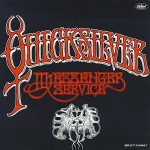
JM: Before you joined up with Jefferson Airplane and Jefferson Starship, you were in Quicksilver Messenger Service. Was there competition, friendly or otherwise, before Quicksilver Messenger Service and the other bands like Jefferson Airplane, The Grateful Dead, etc?
DF: I never felt like we were really competing. I mean, I enjoyed going to hear all of the bands play. I was kind of a fan of all the bands, myself. So I don’t think so.
But I guess it was kind of a friendly competition. We had little games we played on each other. I mean, The Grateful Dead raided our house in Indian costumes once, when we were living way out in Point Reyes. So we played to retaliate being cowboys and attack them on the stage at the Fillmore, but somehow it got mishandled. It’s a long story, but you don’t want to get it here. Pretty funny, though.
JM: With Quicksilver Messenger Service you played at Monterey Pop. What are your memories of that festival?
DF: I was kind of amazed that we got asked to play there, because we didn’t even have a record contract. We had no record at all. Nothing had come out. It was the word of mouth from the live gigs, I guess. So we played.
That was one of the best gigs I’ve ever been to. If you had to quantify it, it was probably the best concert I’ve ever seen, the best weekend. I mean, you just think about it, who was there. The Who, Jimi Hendrix, Otis Redding. Oh my God, you know? Ravi Shankar, The Byrds, The Dead, Janis Joplin. I mean, c’mon.
JM: Sadly I was born in 1970, so I missed all the fun.
DF: Yeah, you did. Where else am I gonna get to stand on stage with my elbow on “Duck” Dunn’s bass amp and watch Otis Redding live? I guess they’re playing together again.
JM: I’m particularly fond of the first two Quicksilver albums. What are your reflections on those?
DF: That was when it was kind of the original four piece. That’s when most of my really fond memories are from, probably those two albums. But it was a wonderful making an album with Nicky Hopkins, too – he’s on the third album [Shady Grove]. It’s not often that you get to meet a genius piano player like that.
Although we have Chris Smith in our band now, who’s pretty amazing, too, actually. You’ll hardly ever see him show off, but, boy, he holds it down.
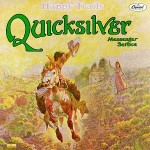
JM: Happy Trails was mostly recorded live. Was that pretty representative of the live show at that time?
DF: Absolutely, it was. We did a lot of the songs from the first album live, too, but we didn’t want to put those on, you know. And representative of the real jamming thing, “Who Do You Love?” was probably one of the longest jams ever recorded [laughs]. We had to edit it down to fit it on the sides.
The “Who Do You Love?” thing was actually from both the Fillmore East and the Fillmore West. I think the beginning and end were from the Fillmore East, and the long psychedelic thing in the middle was from the West, playing at home.
JM: Did you ever meet Bo Diddley?
DF: Yeah, we played a gig with him. At the Fillmore, I believe.
JM: Did you comment on your marathon rendition of “Who Do You Love?”
DF: I don’t think he made any comment whatsoever, that I know of. I’m sure he was happy. I mean, I think he got publishing for it twice on our album. We did take credit for the jams. So we made it the “Who Do You Love?” suite. “Who Do You Love?” at the beginning, and “Who Do You Love?” at the end. We credited it to Bo [laughs].
JM: What led to your departure from Quicksilver Messenger Service?
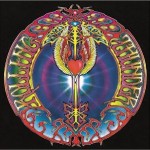
DF: Oh, I don’t know. I wasn’t doing anything. It kind of became Dino Valenti’s band. After John [Cipollina] and Nicky left, I just said if I leave, it’d be hard for them to keep it going maybe. So I said I’d stay for a year. By the end of the year, the signs were that I was just going to be not doing anything, and not really creating anything. It just didn’t feel right for me, so I just left. And I had no real plans on what I was going to do afterwards, at all. I just left and tried to figure it out, and ended up helping Mickey Hart with his first solo album that he made, Rolling Thunder. There’s a lot of stuff on that. I had fun there.
Then Paul and Grace [Slick] asked me, after Marty [Balin] left the Airplane, if I’d go out on tour to support the Long John Silver album. And I said that sounds like a lot of fun. So I did. The three-part harmony – the third part was missing. So I did that and had a lot of fun.
Then, it just kind of drifted along until we realized that Jefferson Airplane wasn’t happening [laughs]. We made a couple of solo albums in between. Ostensibly Paul’s solo album, which we just called Barron von Tollbooth and the Chrome Nun – I think it gave us all three credit for the production. And then, basically the same conglomeration of people from San Francisco made the Manhole album, which was ostensibly Grace’s solo album. Although I had a song on there that she didn’t appear on at all.
JM: That’s somewhat curious. How did that happen?

DF: I don’t know. We were just doing it, and somehow she never found anything to do on it. So anyway, the song called “It’s Only Music” is on there. It’s just me and Paul, and I think actually Gary Duncan came in and played the guitar part on that. And then after that, we wanted to tour to support Manhole, and so we called it Jefferson Starship, referencing Paul’s first solo album Blows Against The Empire.
JM: You were on Blows Against The Empire also, right?
DF: Yeah, there’s some vocals in there somewhere. I must have done something on there. It’s murky – I can’t even remember [laughs].
JM: It’s amazing how many albums were coming out at that time that a lot of the same people were working on.
DF: Oh yeah. Even on Jefferson Airplane’s album Surrealistic Pillow, Jerry Garcia’s on a bunch of that stuff.
JM: When things gelled into Jefferson Starship, what was the vision for the band at that point?
DF: I think it was just to enjoy playing, and make a record and see what happens. It all seemed to work, and it drew Marty back. Marty had a whole bunch more hits, which kind of made me the utility infielder kind of guy [laughs]. So Pete [Sears] and I just played bass and keyboards, switched back and forth. It was fun.
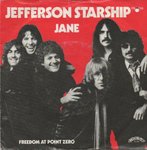
JM: Fastforwarding a little bit, you were one of the songwriters for the hit “Jane”. How did that song come together?
DF: The song was written by me and Jim McPherson. I had the changes and the melody, and Jim helped me with the words. So we split that. Then Craig [Chaquico] had such a cool arrangement of it. I mean, he’s responsible for the arrangement of it. And that’s Paul’s little intro lick, that “De-de-de-de de-de-de de-de-de de-de”. So we gave them credit on that. But it’s basically Jim McPherson’s and my song.
It was about a friend of mine, whose name was Jane. Jane Doe to protect the innocent, or guilty, depending on how you want to look at it [laughs].
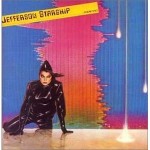
JM: My first exposure to Jefferson Starship and Jefferson Airplane was the album Modern Times. I remember listening to that album a lot when I was a kid. What are your reflections on that particular album?
DF: Modern Times was fun. That’s the one that Grace came back on, right?
JM: Yeah.
DF: So that was cool, having Grace back.
JM: As a kid, the song “Stairway to Cleveland” made quite an impression on me.
DF: I love that song. Every now and then we’ll do that, today. We haven’t done it for about a year now, for some reason. I don’t know why. But Cathy [Richardson] and I really enjoy singing that song. It’s a good joke.
JM: I loved how in the printed lyrics it said “Your manager is a wonderful person” but of course in the real song it says “Your manager’s an asshole”. I must’ve been about twelve years old, and I couldn’t believe that you could do that.
DF: We didn’t want people to read “asshole” on the liner notes. You were too young for that [laughs].
JM: I didn’t let my parents hear that particular song.
DF: “Fuck you, we do what we want!”
JM: I know. That sums it up, right?
What are your plans, musical or otherwise, for the near future? Obviously you’re touring right now with Jefferson Starship.
DF: When we’re not touring I also play in my wife’s band, the Linda Imperial band, which is a lot of fun. We’re recording some stuff there, and I get a chance to play whatever tunes that we want to. I pretty much play any song I ever sang, which is fun.
I’ve still got one in the works, that I’ve been working on for a while that I want to be so good that I haven’t been satisfied with anything on it yet. So we’re working on it [laughs]. I would love to write at least a few more songs
JM: Do you want the set the record straight on anything? You’ve been doing this a while – are there any stories that you’re just like, “No, that’s not how it happened”?
DF: Oh, that’s hard to say. Memory is very personal [laughs], and some people will remember some things one way and some the other way. And I assume that real truth lies in all of it, probably. But it’s hard to tell.
There were lots of tumultuous times here, with people in and out of the band and everything. Dropping the “Jefferson”, you know? That’s when I left. I mean, that was a mutual decision. It was like in Quicksilver. I was kind of useless. I wasn’t doing that kind of thing. If you look at the records, I think you’ll find that the band didn’t write any of the material. It was all outside writers. They were just out shopping for hits. That wasn’t what I grew up doing.
I wasn’t a flashy keyboard player. I never took any lessons. I just played keyboards because it was kind of easy to write a song with a piano, because it’s all there in black and white in front of you. You can get the changes out. So that’s what I was using it for. I never really planned on being a keyboard player. I never planned on being a bass player either, which is what I played most of the time. When I was in Quicksilver nobody was playing the bass, so somebody had to. So I did my version of bass playing.
JM: Sometimes the bass parts are more interesting when people didn’t have that as their first instrument. They approach it a bit differently.
Do you have any plans to tour with Quicksilver again?
DF: I don’t think so. Gary [Duncan] owns the name, and I think… I hope he’s out there and plays some. We do some Quicksilver songs in Jefferson Starship these days. We’ll play a few of them. There’s always at least one Quicksilver song in our set.
JM: For the article, where are you speaking to me from?
DF: Navato, California.
And I’ll tell you, just for the record, I’m having more fun playing with this band than I think I’ve ever had. I mean, I really enjoy everybody in the band. Cathy Richardson is just such a fantastic entertainer and singer. She’s so much fun to be with onstage. And the guy that’s taking Slick’s place is one of the nicest people I’ve ever met, and also one of the best guitar players I’ve ever seen. Jude Gold is just insanely good. You’ll see. Please come to the gig and you’ll see.

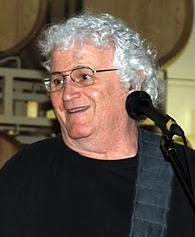
I was glad to discover and read this interview. Just for the record, I have always considered The Fool to be one of my favorite compositions. The piece has several different moods — the same sort of technique that is used in symphomic compositions — and yet The Fool remains an integrated and coherent whole. The Fool is logically wrought, from beginning to end. Unfortunately, I never saw QMS in concert, but I did see Jefferson Airplane and Grateful Dead on a double bill, I saw Country Joe & Fish perform in GG Park, I saw Cream at two concerts, I saw Its A Beautiful Day at two concerts, etc., etc. Thanks again for the interview. — Tom Brody, Alameda, CA